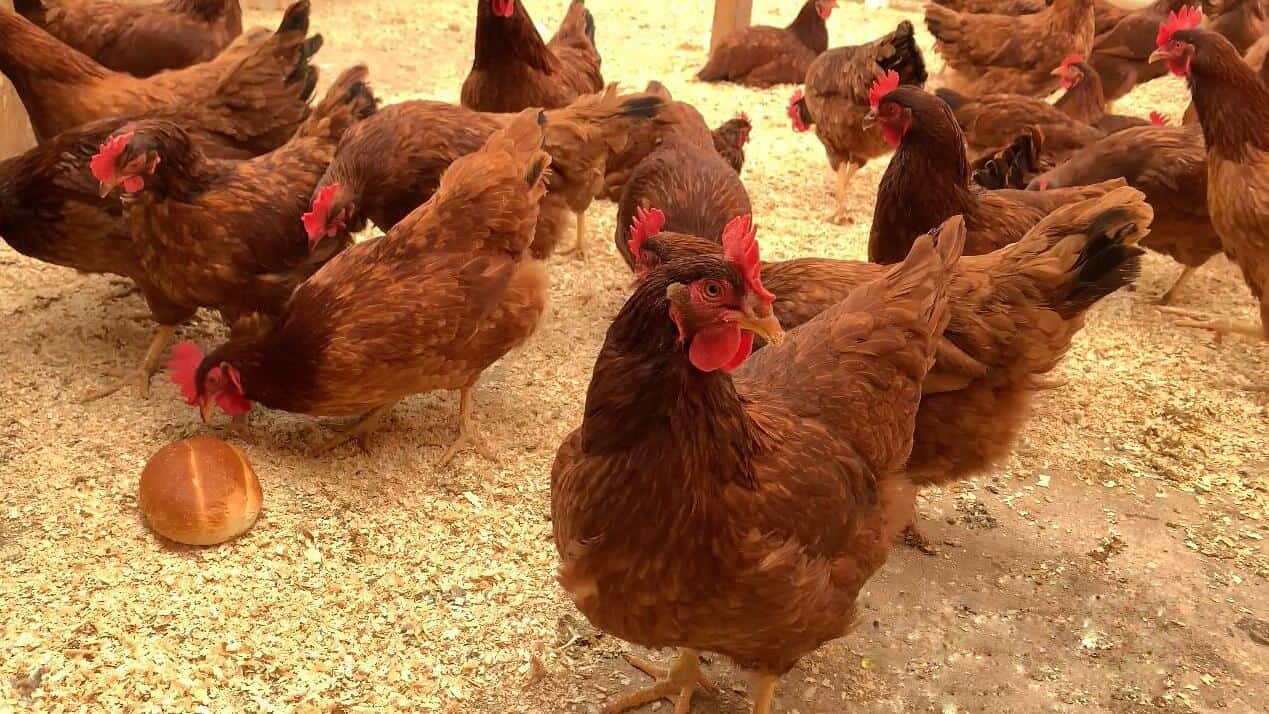If the idea of raising chickens in the backyard has ever piqued your interest, you will find yourself with plenty of company. This fun hobby provides healthier eggs and meat that taste better than supermarkets provide. These tips will help you with the enjoyable, worthwhile pastime of raising chickens yourself.
1. Know the Pros of Chicken Raising
The benefits of raising chickens are pretty clear. The cost is incredibly low when compared to raising other animals. They happily dine on table scraps and chicken feed is inexpensive. For this price, you get value from them in the form of eggs and meat. Chickens are low in terms of maintenance.
Simply feed and water them daily and clean the coop out either weekly or biweekly, depending on how many chickens you have. Check for bugs in their feathers every week or so. They also provide fertilizer and control of pests. When chickens rove about a backyard, they peck at bugs while emptying their bowels on a whim, offering natural fertilizer.
2. Know the Cons of Chicken Raising
There are some drawbacks to raising chickens. They are not ideal for guard pets; even geese make better guardians than do chickens. They are also messy. Their droppings do not smell pleasant, and the smell can carry. Also, diseases spread through a flock quickly. When one chicken gets a virus, the odds are the others will get it as well.
3. Know the Local Laws
Particularly if you live within city limits, it is important for you to check on the local ordinances. Most cities, you will find, have laws regarding the number of chickens that you are permitted to raise as pets.
Some rules allow for hens but not for roosters. Do not make long-term plans that will wind up breaking laws in ignorance. You may, while you are at it, check with neighbors as well. Some will endure the smell and noise without complaint for the cost of a few fresh eggs occasionally.
4. Choose the Right Breeds
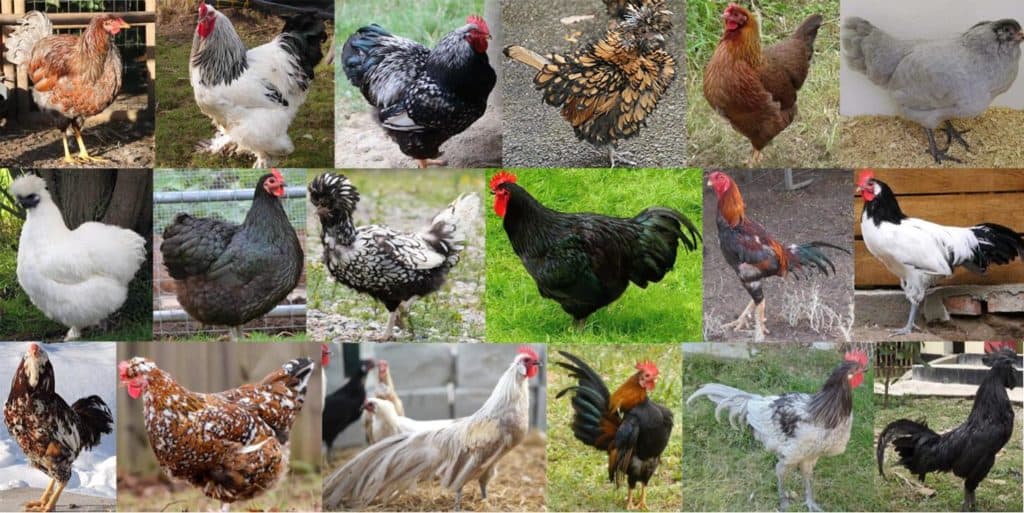
Chickens can be kept with several considerations in mind. They provide food, they can be companion animals, and they can be ornamental. All of these factors go into which breed of chicken you select.
Consider whether you desire egg production solely, meat and eggs combined, exhibition only, or meat alone. This is along with understanding the personalities of various breeds. Some are friendlier than others; flighty ones do not like to be handled.
For eggs, try White Leghorns, Golden Cornets, or Red Sex Links. For meat, try the Cornish Cross. For combinations of the two, try Sussex, Wyandotte, or Plymouth Rock. Exhibition chickens run the gamut of breeds, but bantams tend to outnumber the larger breeds of fowl.
5. Build a Proper Coop
Good homes help chickens grow happy and healthy. By design, a coop must be secure against any predator type. Every angle of the pen, including top, sides, and bottom, needs to be structured to stand firm against the strength of predators longing to snack on eggs and chicken meat.
Choose a wire mesh appropriate for your location. While you are securing the coop, remember that rats are a threat that can burrow up from below. The floor of the coop must be blocked for this reason.

A coop needs to be spacious and roomy. Allow for two to four square feet per bird. The coop should have proper ventilation without being breezy or drafty, built to endure the weather changes in your area. Roosting poles are required for slumbering hens, as well as nesting boxes for egg laying. Finally, make the coop easily accessible for you, but not for predators.
If you are not good at DIY jobs, We have a complete guide to buying a chicken coop.
6. Making the First Purchase
Start small if you have a limited budget. Remember that hens do not lay eggs on demand; you may need to wait some time. Some people choose to buy day-old chicks because of the price.
These young fowl have a higher chance of death, however, and are higher maintenance. They may require artificial brooders or foster mothers. Young chickens are also difficult to sex. For egg raising, you do not want more roosters than hens.
7. Choose a Brooder
When raising chickens, if you do use chicks to start a flock, you need a brooder. This must be kept indoors. It can be kept in the house, although most people raising chickens prefer to use the garage. Brooders can be projects built yourself; plan for up to $70 in parts, including the requisite lighting.
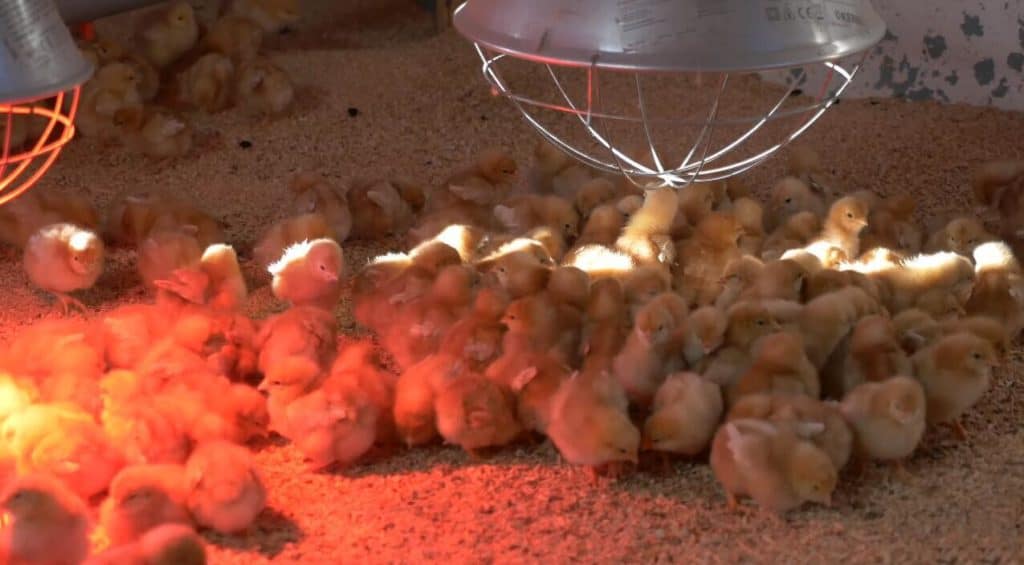
For the lighting, ideally, you want a lamp that is 250 watts and can produce sufficient heat for the wellbeing of the chicks. Brooders assist chicks in thriving at an ideal temperature. Generally, this is about 90 degrees Fahrenheit. This regulated temperature should slowly be decreased until the chicks are prepared to be moved outside to the coop.
8. Feeding Chicks
Starter feeds are necessary, when raising chickens, to feed chicks if you decide against starting out with fully grown hens. These consist of 20% protein and should be fed to the chicks for the first six weeks. A medicated variety contains an anti-coccidiosis drug, which blocks thiamine.
While not offering complete immunity, it aids chicks in defending against the disease. After this starter feed, pullets move on to a grower feed. This is fed from the chick’s sixth week, when they leave the brooder, to their 14th week. It permits growing at a pace that is appropriate, vital when raising chickens.
9. Adding to the Flock
There is a bit of a challenge every time you add new birds to an existing flock when raising chickens. There will be stress involved. Usually, however, fights over pecking order settle down within a few days. Then adaptation can commence. One step to make this a smoother process is to let the birds see each other without physical contact.
Another is to utilize distraction techniques. Try hanging a whole cabbage just above the heads of chickens. They will peck at it while anything remains. Or let the flock loose for a freer range; the old birds will be excited to dig for grubs and bugs. They will not notice the newcomers roaming about.
10. What to Feed Your Chickens
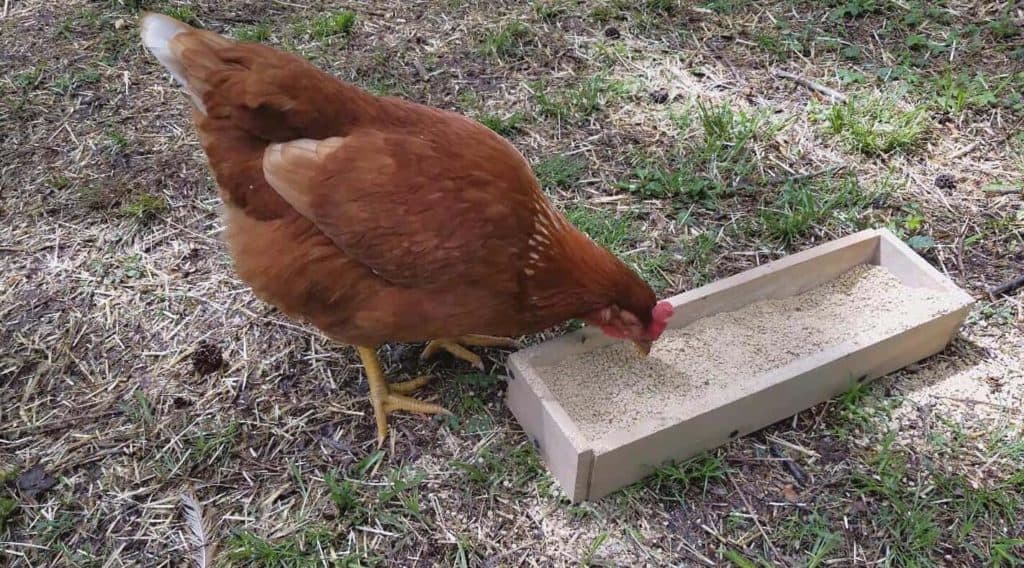
Chickens can and will eat nearly everything. This ranges from meat to vegetables; they will even consume dog kibble with gusto. They thrive on table scraps. They will also wipe out all insects and worms in a yard. Chickens also delight in grains.
You can feed chickens by scattering the food or by putting it inside a container that is sufficiently large to accommodate the number of chickens dining. They love bones that have shreds of meat attached. When raising chickens, the best foods to give them are pellets, corn, feeds, and grains.
For raising chickens that are egg-laying hens, remember that they require calcium. Crushed clamshells can be added to meals for this purpose. Be sure they are crushed so the hens do not see them as the shells of their own eggs.
11. Avoid These Foods when Raising Chickens
Apples can cause digestive problems if given regularly. One apple every two weeks and split amongst four birds are acceptable but do not make it a frequent habit. Potato peelings are not desired by most chickens. Root crops do not have a taste that appeals to them.
The toughness of orange peelings is generally too much for chickens. Chickens also, for whatever reason, do not like bananas. Tomato can be offered in small quantities, but in excess, it can affect the droppings. When raising chickens, feed them what they enjoy and are healthy for them.
12. Summer Precautions

When summer is the basic season in an area, chickens are prone to suffering from excessive heat. They will be at risk of dehydration in these conditions. Make sure the water supply stays clean and never runs dry. Do not let chickens roam about unless they have a source of shade. If you have no run for them, the pen must have adequate ventilation.
Understand that, when raising chickens during heat waves, fewer eggs are produced. This is typically a sign of stress due to excessive heat. Once the heat subsides, look for egg laying to resume its normal frequency and number.
12. Winter Precautions
Some chickens, such as the breeds with particularly fluffy feathers, have little problem in winter conditions. Most can adapt to extreme cold because, with time, their bodies can adapt their metabolisms. Never attempt to instantly heat your coop when raising chickens for fear of colds or freezing. It can lead to a dead flock on the morrow.
The biggest concerns are frostbite and frozen water supplies. Chicken’s wattles and combs can become frostbitten; rub moisturizer such as petroleum jelly on these parts every other day to help combat this. As for water, use a chicken coop heater and make sure the water is liquid and free of impurities.
14. Raising Healthy Chickens
Raising chickens that are healthy requires certain daily chores. These are not particularly time-consuming, but must be attended to regularly. First, ensure the feed and water are full constantly. They need these to live. Second, regularly clean their water container.
When raising chickens, understand that they refuse to drink from the water that is too cloudy or dirty. They will grow dehydrated, succumb to illness, and then death. Check their health each morning. Do they seem active, bright, and healthy? If not, consult a veterinarian. Put eggs in the fridge promptly to maintain freshness.
15. Check the Coop Regularly
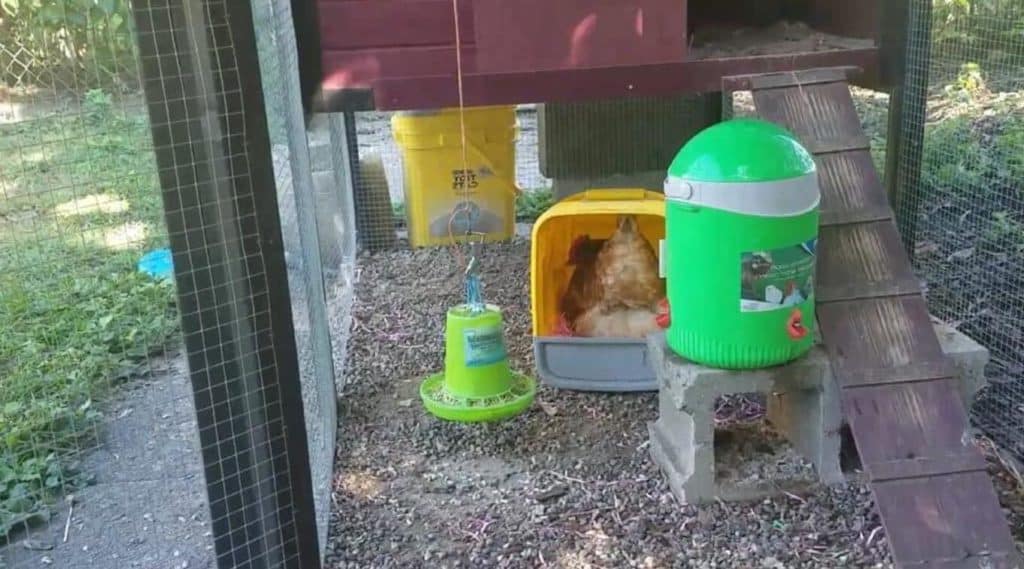
Every now and then, when raising chickens, visit the coop and examine it and the birds. Before leaving, ensure everyone is safe inside the coop and outside in the pen. Check for rat holes; if you find any, block them. If all seems well, shut the door tightly when you leave. When dusk arrives, the chickens should be safe in their nests.
16. Prepping Chickens When Leaving
Unlike with other pets, chickens can be left for a few days without a great deal of thought. Just ensure they have sufficient water and food to keep living happily while you are gone.
When you return, if you find eggs, they are fine to be collected and stored in the refrigerator. Be sure the coop is securely shut before leaving, and do a check as mentioned above. Ensure all the chickens seem bright and alert, in good health, to avoid tragedy while you are away.
17. Keep Enough Chickens
Chickens are sociable animals. Plan for a minimum of three birds when raising chickens. A half a dozen chickens is a good number, although of course, you can have more, provided you have the room and the resources for them. With three to six hens, you will have a ready supply of eggs.
Depending on the breed, an adult hen lays roughly two eggs every few days, on average. Chickens are most productive within their first couple of years; after that, egg laying slows. Consider cycling younger birds in as hens age out of prolific egg laying. This ensures a steady supply for you to consume, share, or sell.
18. Understand Egg Freshness and Cleanliness

At least a dozen days from the day of laying are required for an egg to mature and develop an embryo. Upon collecting eggs, you may find dirt or feces smudging the surface. Do not attempt to scrub this off. The layer is important. The bloom refers to the membrane on the egg’s surface.
It protects the egg against bacteria and such microorganisms that try to penetrate the shell. Scrubbing removes the protective covering. If you must have clean eggs, wash them with extreme gentility under warm water.
Conclusion
Raising chickens is fun and rewarding. Some breeds are positively cuddly, especially when hand-reared to be that way. Other breeds are more stand-offish but provide more eggs. Whichever breed you choose, you can enjoy the sight of proud birds pecking about their space, eliminating insects, and preparing to lay your eggs.
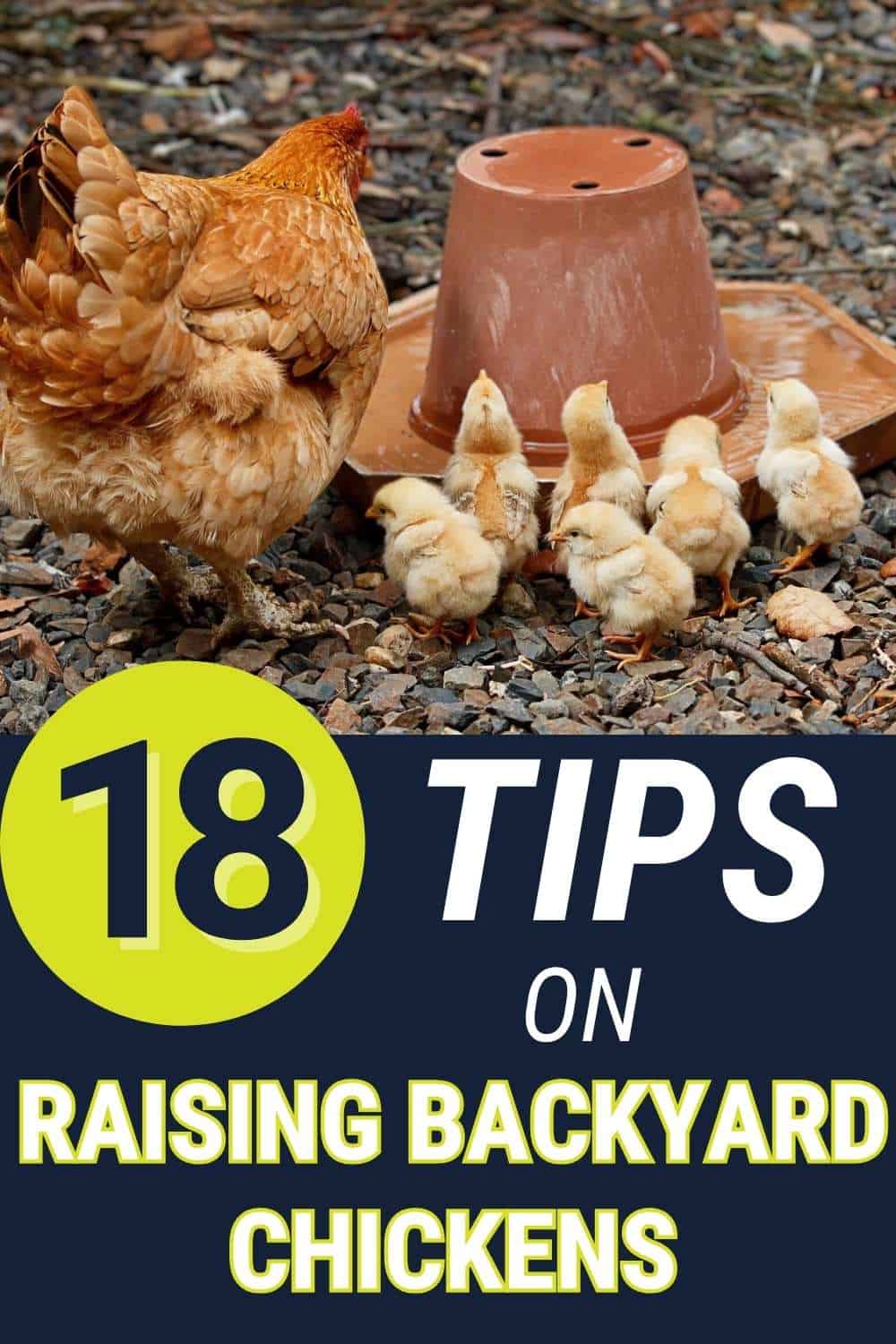

Joseph Hudson has been raising chickens for over 15 years. In 2018, he completed the Agriculture & Natural Resources program at Mt. San Antonio College. He currently raises over 1400 chickens on his 7.5-hectare farm. He keeps sharing his experience on raising healthy and happy chickens on Chicken Scratch The Foundry.
